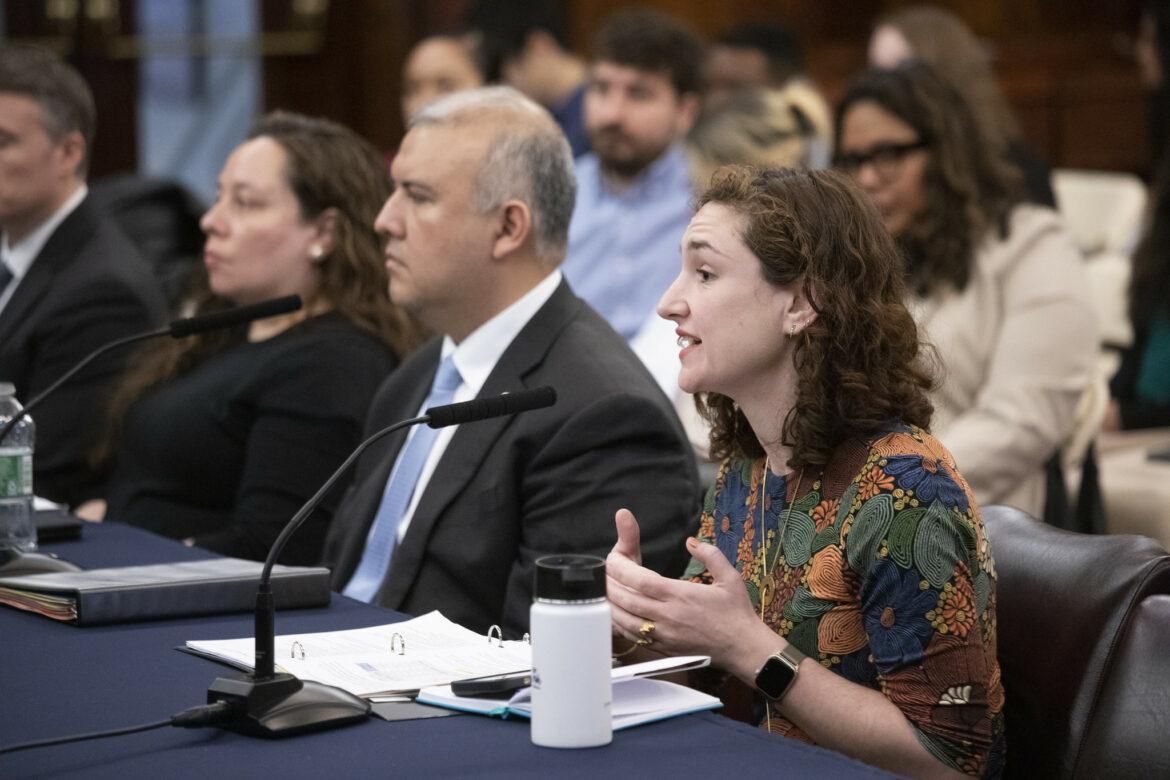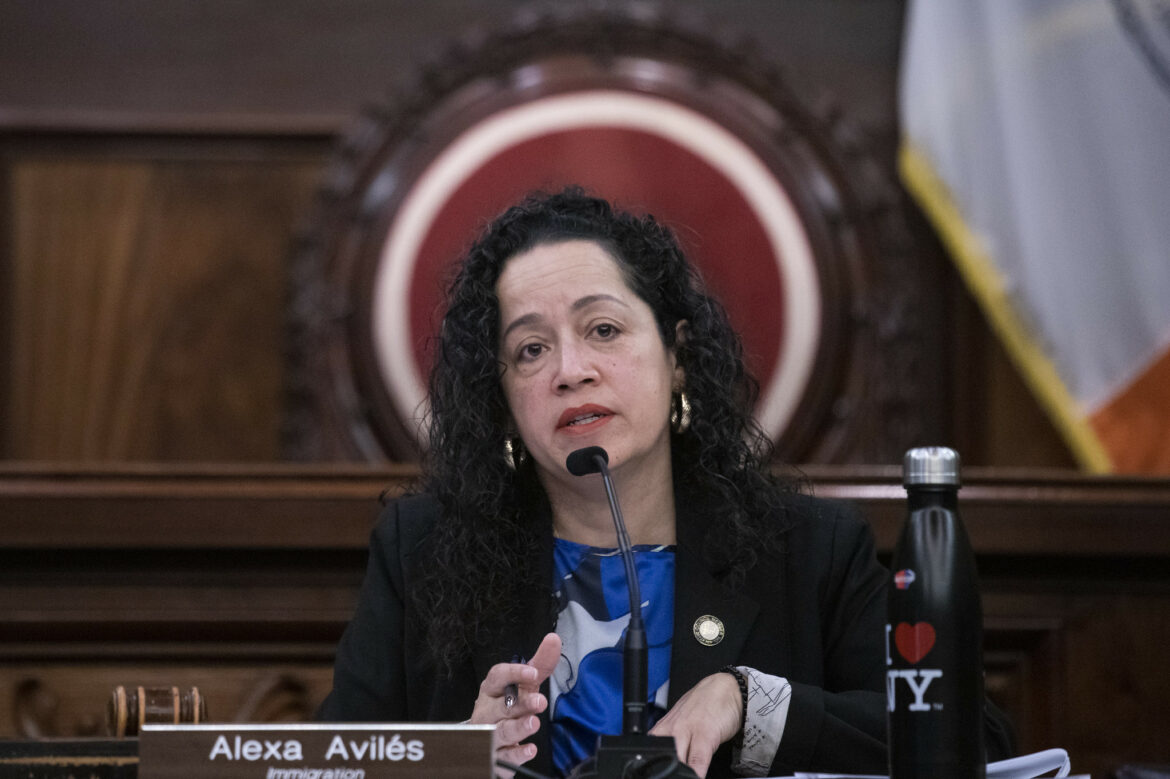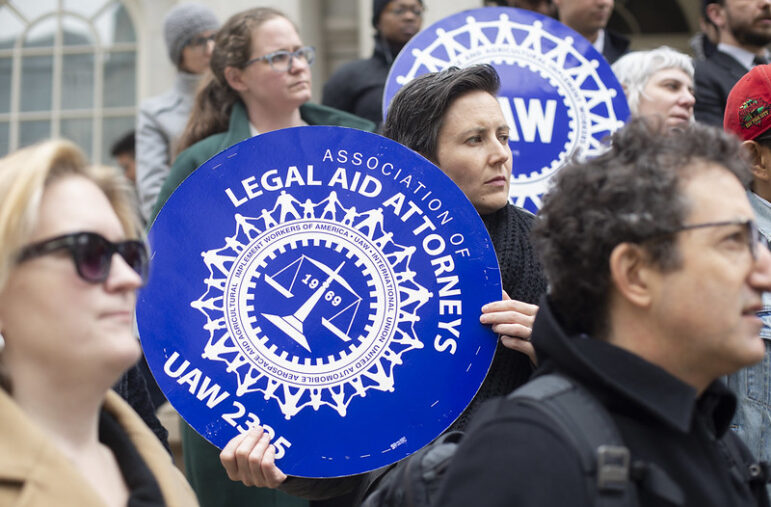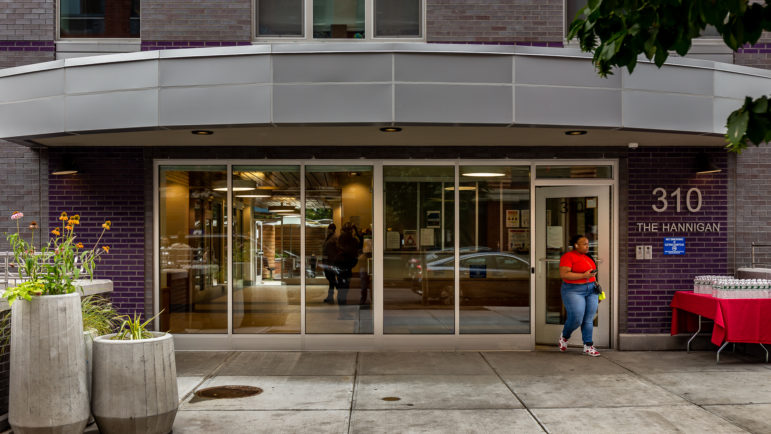As of the end of January, the city had purchased 20,500 plane or bus tickets to relocate immigrants in its shelter system to destinations outside the five boroughs, totaling $7.6 million, officials said Tuesday.

John McCarten/NYC Council Media Unit
Office of Immigrant Affairs Commissioner Manuel Castro and Office of Asylum Seeker Operations Director Molly Schaeffer testifying to the City Council Tuesday.Lea la versión en español aquí.
Editor’s Note: A previous version of this story misstated that the budget for MOIA and OASO totaled $2.5 million, when that funding was only for staffing those offices. MOIA’s total budget is $16.5 million, which is more than the city spends on out-of-town tickets.
City Limits regrets the error.
The first round of City Council preliminary budget hearings for fiscal year 2025 began this week, among the first of which questioned the funding plans for the offices of Immigrant Affairs (MOIA) and Asylum Seeker Operations (OASO)—the latter created a year ago to manage and coordinate the city’s response to the arrival of new immigrants in its shelter system.
While Mayor Eric Adams decided in February to cut only the cost of immigrant services after higher-than-expected tax revenues—axing some of the previously announced, across-the-board cuts to other city agencies—councilmembers have called for additional reversals.
Still on the chopping block is a 10 percent cut to city spending on migrants, about $600 million on top of earlier 20 percent cuts of about $1.7 billion.
Nearly two years since asylum seekers began arriving at the city’s shelters, Adams has said he is now transitioning into a “stabilized state,” although maintains that the city is still in crisis mode. “We’re treating it differently because the emergency still exists. But we are managing it differently,” Adams said to ABC News.
Since mid-January, the number of asylum seekers in the city’s care has dropped from a high of 69,000 to 64,000, after the administration’s months-long implementation of 30- and 60-day shelter deadlines, which have been strongly criticized by advocates and some councilmembers.
Nearly half of the families who received 60-day eviction notices have left the shelter system, and a City Hall spokesperson told City Limits last week that some 9,100 families with children have seen their notices expire. Another 69,200 immigrant adults in the system have been issued the deadlines, about a quarter of whom returned to request another shelter placement.
As of January, the city has opened 216 emergency shelter sites and spent approximately $3.77 billion on efforts to shelter newly arrived immigrants, according to City Hall’s Asylum Seeker Funding Tracker.
Both families and adults can reapply for shelter after their initial stays expire—though the process can be an ordeal, especially for those without children, often taking days or even weeks.
They also have the option to move out of the five boroughs or even return to their home countries with a city-issued plane ticket.
During the hearing, the new chair of the City Council’s Committee on Immigration, Councilmember Alexa Avilés, questioned OASO Director Molly Schaeffer about the number of tickets issued and their cost.
Schaeffer said that as of the end of January, the city had purchased 20,500 plane or bus tickets, totaling $7.6 million—and the city has seen an uptick in requests for air travel out of the country, she added.
“Airline companies must be real happy,” noted Avilés, who repeatedly said during the hearing that the budget dedicated to MOIA and OASO is insufficient, considering that nearly 40 percent of the city’s population is foreign-born.

John McCarten/NYC Council Media Unit
Councilmember Alexa Avilés, new chair of the Committee on Immigration, repeatedly said during the hearing that the budget dedicated to MOIA and OASO is insufficient.“It’s grotesque,” Avilés complained of the two agencies’ current funding.
“Has there been any communication between OMB and MOIA on creating a full agency for immigrant affairs?” she asked during the hearing.
“No,” Castro said. “Not since I joined the administration.”
Avilés then asked almost the same question of Schaeffer, who said, “We’re constantly thinking about how to do the long-term asylum seeker operations better and figure out what makes the most sense for the next couple of years.”
Avilés said the lack of a centralized office “is a bit of a nightmare,” adding that the city’s immigrant population “deserves a full agency that can consolidate services and could make this less of a run across agencies where you have no jurisdiction.”
The mayor’s Program to Eliminate the Gap (PEG) in November included cuts to the Rapid Response Legal Collective, run in part by MOIA, which provides legal help in a wide range of immigration cases, including people detained by ICE, about to be detained and deported, or those seeking to reopen cases.
Cuts to the program, which was created in 2019 with $1 million from the city and the state, come as demand for these services soars.
At another Council budget hearing earlier this week, Lisa Rivera of the New York Legal Assistance Group (NYLAG)—one of three nonprofits that staffs the Rapid Response Legal Collective—said the program has been “inundated with requests to represent pro se applicants for asylum who have been ordered deported by judges in hearings that are rife with due process and other legal issues.”
Failure to fund meaningful representation for new immigrant arrivals, she testified, “will undermine city efforts to create pathways to work authorization and decrease reliance on the shelter system.”
The Council’s Immigration Committee urged the administration to budget $150 million to expand immigrant legal services as well as adult literacy programs, which are also in high demand in the city’s three public library systems.
“This is about sustainability of services for immigrant New Yorkers,” said Avilés.
OASO alone has filed more than 15,339 work authorizations on behalf of immigrant New Yorkers, more than 10,745 Temporary Protected Status forms, and 11,630 asylum applications, Schaeffer said.
Tuesday’s hearing was the second in which the city’s spending on immigrants has taken center stage, following Monday’s Finance Committee hearing.
The Council will hold additional oversight hearings for several other agencies that run programs for immigrant communities—such as the Department of Youth and Community Development, Human Resources Administration, Department of Education and New York City Health and Hospitals—in the coming weeks.
The Adams administration and the City Council have until June 30 to hammer out a final budget for fiscal year 2025, which begins July 1.
To reach the reporter behind this story, contact Daniel@citylimits.org. To reach the editor, contact Jeanmarie@citylimits.org.
Want to republish this story? Find City Limits’ reprint policy here.








